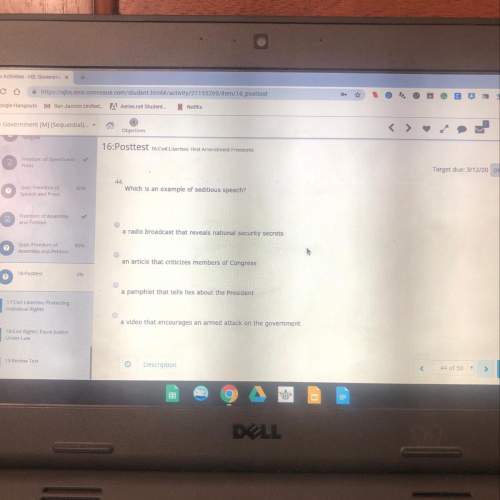Some history questions pls helps ASP!
What factors at the end of World War I ultimately contri...

History, 06.05.2020 01:28 anthonygarib24
Some history questions pls helps ASP!
What factors at the end of World War I ultimately contributed to the global depression?
1. Anger stemming from the brutal war made it difficult for countries to effectively trade and cooperate
2. The US demanded recover European countries repay their war loans, created extreme economic instability, and insecurity
3. Huge and important economies were deeply impacted by years of warfare, leaving the rest of the global economy unstable
(A) Just 1
(B) 1 and 2
(C) 1 and 3
(D) 1, 2, and 3
2 Read the selection from the article.
However, before World War II came along and revolutionized all political and economic formulas, none of FDR’s exertions managed to drop the unemployment rate below 14 percent.
Which of the following can be inferred from the selection above?
(A) FDR's attempts to end the Great Depression were a complete failure.
(B) Despite the changes FDR made, he could not totally end the Great Depression.
(C) FDR made key mistakes in his attempt to dramatically change the government.
(D) FDR did not make a strong enough effort to end the Great Depression.
3 Based on this article, which statement best represents the economic environment at the end of World War I?
(A) The world had entered into a global economy, wherein national economies were interconnected.
(B) Industrialization and modernization helped boost the US economy. (C) Individual countries had their own isolated economic systems, some of which remained fine.
(D) Environmental disasters around the world resulted in a widespread economic downturn.
4 Read the following statement.
The U. S. government was unprepared to deal with economic problems.
Which sentence from the article BEST supports the statement above? (A) The United States' actions in World War I were minor and occurred only toward the end of the conflict that lasted from July 28, 1914, to November 11, 1918.
(B) Even the country's minimal role went against its tradition of not involving itself in Europe's affairs, which resulted in Americans turning themselves and their country even more inward during the 1920s.
(C) Meanwhile, the government's public spending was low and the federal government was in a weak state to fight the looming depression.
(D) Known as the Great Crash, stock prices plunged, causing thousands of banks to fail, tens of thousands of businesses to collapse, and millions of people to become unemployed.
5 How did domestic US policy hurt the economies of other countries?
(A) The US refused immigrants entry which meant that more impoverished people remained in their home countries. (B) When they refused to join the League of Nations, the US hurt other economies by cutting the amount of money the league would have.
(C) The US Government took all their money out of other countries' banks when World War I began.
(D) High taxes on goods from foreign countries made international trading harder.
6 Read the sentence from the section "Stocks crash, millions out of work."
In October of 1929, the bubble burst.
Based on the article, the word "bubble" refers to all of the following EXCEPT:
(A) increasing stock prices
(B) feelings of optimism
(C) limits on immigration
(D) the private banking system
7 Which of these is something the author of the article states happened as a result of the Great Depression?
(A) the start of World War II
(B) the election of Herbert Hoover
(C) the formation of the United Nations
(D) the passing of the 22nd Amendment

Answers: 2


Another question on History


History, 21.06.2019 19:00
Which of the following was a characteristic of government proposed by the new jersey plan? it denied congress the ability to levy taxes. it based representation on population rather than keeping states equal regardless of size. it denied congress the ability to regulate trade. it preserved an executive committee rather than adopting a singular president.
Answers: 1

History, 21.06.2019 22:30
Did president truman warn japan against a second bomb attack
Answers: 1

History, 21.06.2019 23:30
Select the correct answer from each 1. ( )was a nineteenth-century artistic movement that influenced nationalism in europe. it emerged as a reaction to the emphasis on 2. ( ) in enlightenment philosophy. 1. liberalism, socialism, romanticism 2. reason, emotion, religion
Answers: 2
You know the right answer?
Questions

Social Studies, 22.07.2019 20:30


English, 22.07.2019 20:30

English, 22.07.2019 20:30


World Languages, 22.07.2019 20:30


English, 22.07.2019 20:30

History, 22.07.2019 20:30

Biology, 22.07.2019 20:30

English, 22.07.2019 20:30

Mathematics, 22.07.2019 20:30



Mathematics, 22.07.2019 20:30

Mathematics, 22.07.2019 20:30







